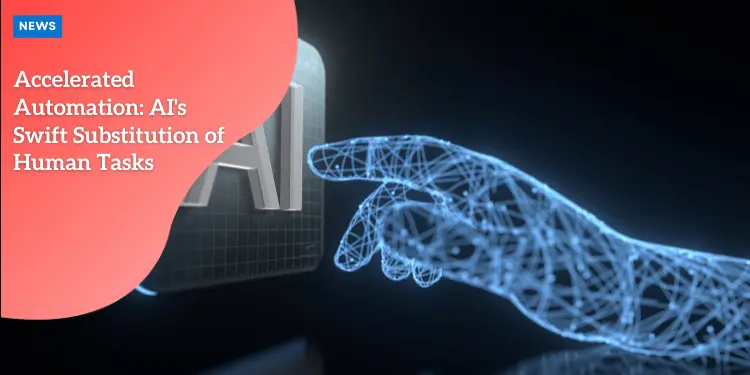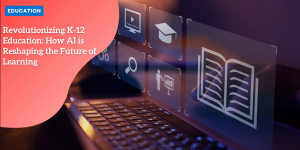Accelerated Automation: AI’s Swift Substitution of Human Tasks
By: Maicon Posted in: June 21, 2024 Last Update: February 6, 2025

In the rapidly evolving landscape of Corporate America, artificial intelligence (AI) is emerging as the cornerstone of automation strategies, effectively replacing tasks traditionally performed by human employees.
Anúncios
Over the past several years, AI technologies have developed at an extraordinary pace, influencing multiple sectors of the economy.
From automating mundane and repetitive administrative tasks to more complex decision-making processes, AI is reshaping the way businesses operate and how employees interact with technology.
With its potential to optimize workflows and reduce operational costs, AI is set to redefine the workplace for years to come.
Anúncios
A recent survey conducted by Duke University in collaboration with the Federal Reserve Banks of Atlanta and Richmond sheds light on the profound shift towards AI integration in business operations.
The results reveal key insights into how AI is being adopted, as well as the broader impact on the job market, economic considerations, and regulatory frameworks.
This survey, which examined the adoption of AI technologies in large companies across the United States, highlights how businesses are leveraging these innovations to drive efficiency and competitive advantage.
Anúncios
The Rise of AI in Corporate America
According to the survey findings released on Thursday, more than 61% of large companies in the United States are planning to implement AI within the next year to automate various operational tasks.
These figures reflect a rapidly increasing trend towards automation, particularly in sectors that have long relied on human employees for routine work.
The tasks being automated include handling financial transactions such as paying suppliers, processing invoices, conducting risk assessments, and executing complex financial reporting tasks.
This widespread adoption of AI in corporate functions underscores the strategic pivot towards leveraging AI to streamline processes, reduce costs, and enhance overall productivity.
Automation has the potential to deliver significant value for businesses, offering more efficiency, precision, and speed in day-to-day operations.
In particular, repetitive administrative tasks—such as data entry and analysis—can be easily handled by AI, freeing up employees to focus on more strategic initiatives.
By replacing labor-intensive processes with automated systems, companies can reduce human error, improve decision-making, and enhance the scalability of their operations.
This shift towards AI-powered automation is not just a technological upgrade; it represents a fundamental transformation in how businesses think about labor and operational efficiency.
AI allows companies to not only reduce costs but also improve the quality of their services and products by providing real-time data analysis and insights.
In an increasingly competitive and globalized marketplace, this technological shift is viewed as essential for staying ahead of competitors and meeting the growing demands of consumers.
AI’s Role in Creative Endeavors
Beyond operational efficiencies, AI is also making significant inroads into creative domains within businesses.
Traditionally, creativity has been seen as the domain of human talent.
However, AI is now being employed to complement human creativity and enhance the development of content.
Companies are increasingly relying on AI-driven tools like ChatGPT and other chatbots for crafting compelling job postings, drafting press releases, and even devising intricate marketing campaigns.
By automating these tasks, businesses can save time and resources while still producing high-quality content.
This expansion into creative realms highlights AI’s versatility and its potential to augment human capabilities rather than solely displacing them.
AI’s ability to analyze large volumes of data and identify patterns makes it an invaluable tool in understanding consumer behavior, identifying trends, and generating targeted marketing materials.
In marketing, for instance, AI can analyze customer preferences and tailor content recommendations, advertisements, or product designs to specific target groups.
Moreover, AI-powered systems can assist in brainstorming and generating ideas for creative campaigns, allowing human creators to focus on refining and polishing those ideas.
For example, AI can generate text formats like poems or scripts, acting as a springboard for human refinement.
While AI cannot replicate the raw ingenuity of human creativity, it can become a powerful collaborator in the creative process, providing a framework for inspiration and ideation.
This collaboration between human and machine is fostering a new era of creative expression, pushing boundaries and leading to unforeseen possibilities.
This growing intersection between AI and creativity is not limited to marketing and content creation.
In industries such as design, architecture, and entertainment, AI is assisting with visualizations, simulations, and even predictive modeling.
By working alongside human experts, AI is expanding the creative horizons of professionals, enabling them to explore new ideas and approaches that were previously unimaginable.
Strategic Imperatives and Economic Realities
Duke finance professor John Graham, the academic director of the survey, emphasized the strategic imperative for companies to embrace AI technologies.
He cautioned that failure to adopt AI could potentially leave businesses lagging behind competitors in terms of innovation, operational efficiency, and customer satisfaction.
The financial and operational benefits of AI are so significant that companies that fail to adopt these technologies risk losing their competitive edge in a rapidly transforming business environment.
As AI continues to become an integral part of the business landscape, companies are recognizing the need to invest in these technologies not only to improve efficiency but also to meet rising consumer expectations.
Businesses are increasingly expected to provide personalized experiences, respond to customer needs in real-time, and innovate faster than ever before.
AI enables companies to meet these demands by automating processes, providing deep insights into customer behavior, and facilitating faster decision-making.
Impact on Job Market Dynamics
While the integration of AI is poised to reshape the job market, experts suggest that immediate widespread job displacement may not be imminent.
Graham noted that, in the short term, AI adoption is likely to result in reassigning tasks rather than outright job cuts.
AI is expected to complement the workforce by automating certain tasks, thereby allowing human employees to focus on higher-value work that requires creativity, empathy, and complex decision-making.
This transitional phase allows human employees to focus on more strategic and meaningful tasks, potentially enhancing job satisfaction and productivity.
As a result, businesses may experience a shift in the skills required from employees.
Those in the workforce will need to adapt to the changing demands of the job market by developing new skills in AI literacy, data analysis, and problem-solving.
Renowned investor Reid Hoffman, co-founder of LinkedIn, echoed similar sentiments, projecting a gradual transformation over the next few years rather than an abrupt displacement of human workers.
Hoffman anticipates a future where AI functions as a supportive “co-pilot,” aiding humans in various facets of daily life and professional endeavors.
In this vision, AI augments human capabilities rather than replacing them entirely.
AI and Economic Considerations
As businesses navigate economic uncertainties such as inflationary pressures, the role of AI in moderating costs becomes increasingly relevant.
The CFO Survey highlighted that while inflation ranks among the top concerns for chief financial officers (CFOs) across the United States, companies that have implemented AI technologies over the past year are cautiously optimistic about mitigating some inflationary impacts.
AI’s ability to optimize processes, enhance resource allocation, and identify inefficiencies allows businesses to maintain profitability and better manage rising costs.
This cautious optimism stems from AI’s potential to optimize processes and potentially stabilize price increases in the long run.
By streamlining operations, reducing waste, and improving supply chain management, AI can help businesses minimize the impact of rising costs, thereby offering a potential buffer against inflation.
Regulatory and Ethical Considerations
Despite AI’s promising applications, there are significant regulatory and ethical considerations that accompany its rapid adoption.
Treasury Secretary Janet Yellen and other policymakers have raised concerns about the need for robust regulatory frameworks to govern AI deployment, particularly in sectors like finance, where AI’s role in decision-making could pose risks without adequate oversight.
AI systems can influence critical decisions that affect people’s lives, and as such, it is essential to ensure that AI algorithms are transparent, fair, and accountable.
Democratic Senator Gary Peters highlighted gaps in current regulatory frameworks, emphasizing the need for clearer guidelines on human involvement in AI-driven decision-making processes, especially in sensitive areas like financial trading.
The ethical implications of AI are profound, particularly when it comes to privacy, bias, and accountability.
There is growing recognition of the need to develop ethical standards for AI development and deployment to ensure that these technologies are used responsibly and for the benefit of society.
Looking Ahead: Balancing Innovation with Caution
As companies continue to integrate AI into their operational frameworks, there is a growing consensus on the importance of balancing innovation with caution.
Graham urged companies to exercise prudence in their AI initiatives, emphasizing the need for robust risk management systems and contingency plans to mitigate potential pitfalls associated with rapid technological adoption.
Companies must carefully consider the long-term implications of AI, including potential disruptions to the workforce, ethical concerns, and the risks of over-reliance on automated systems.
In conclusion, while AI promises to revolutionize business operations and enhance productivity, its widespread adoption necessitates careful consideration of economic, regulatory, and ethical implications.
By embracing AI as a transformative force and implementing comprehensive risk management strategies, businesses can navigate the evolving landscape of automation while maximizing benefits for both stakeholders and society at large.
As we look toward the future, the challenge lies in finding a balance between harnessing AI’s full potential and ensuring its responsible, equitable, and ethical integration into business and society.





